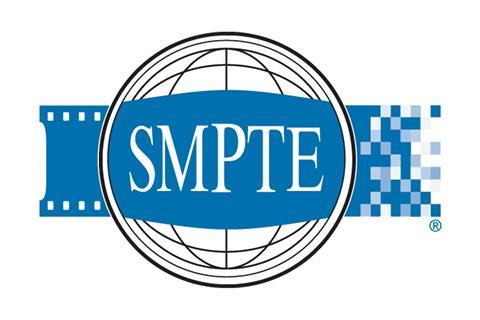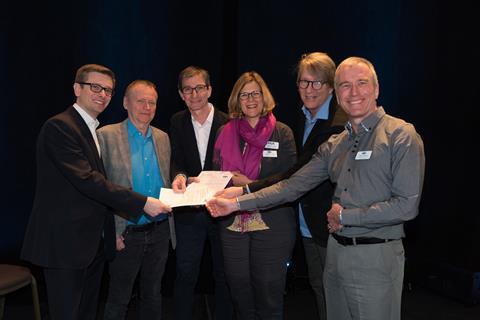SMPTE and DPP explain why they are working together on the creation of an Interoperable Master Format (IMF) specification for broadcast and online and what progress has been made so far.
One of the talking points of NAB will be the verification that SMPTE is happily transitioning to the new world of specifications.

After a unique collaboration with Digital Production Partnership (DPP), so valuable for defining a new spec modus operandi, SMPTE will offer for feedback a draft specification, for broadcast and online applications, of the Interoperable Mastering Format (IMF).
Dubbed SMPTE ST 2067, this project also had support from The European Broadcasting Union (EBU), and the North American Broadcasters Association (NABA).
Core, constrained elements of the draft spec include MXF track files, composition playlists, output profile lists, and IMF packages.
“The days of having 100 rendered versions of your title, soaking up all that disc space just in case you get to re-use some of them, have long gone” - Bruce Devlin
Also referenced is the EBU io/qc project for carrying quality-control metadata, plus EBU-TT (subtitling format definition) users will have the option of EBU-STL subtitles in Europe and CTA-608/CTA-708 captions in North America.
SMPTE Standards VP Bruce Devlin, and Andy Wilson, DPP Head of Business Development and Delivery and also Manager of the SMPTE UK section explained the plans for IMF going forward, and the significance of the major shift in SMPTE franking policy.
The specification process
“The world is moving more and more to software and we are getting much more agile and much more iterative, and what we are really trying to do is reduce the friction of getting into standards,” said Devlin.

“You might be doing something like an early stage development where you are iterating around your business requirements while you are doing the design.
“That’s a good use case for specs, but you might also be taking an existing standard, a big heavyweight thing like IMF, and be tailoring it for a particular region or territory,” he added.
“That would involve using the standard but using other things as well like poster art or some private metadata. Where you are trying to iterate around the technology against business requirements for a specific economic reason is really what we are trying to address.”
Feedback from NAB attendees and exhibitors will be vital, so how quickly might the spec fire up to being a standard?
“There are two elements to this, starting with the actual spec as submitted by the DPP.
“It is relatively stable in terms of technology, and we are going to NAB with implementation demos. They will show how we have managed to iterate the technology and get it to a point where it works well for the UK market,” said Devlin. “Then on the flip side of the coin there is the specifications process as a concept.

“SMPTE freely admits that this is a relatively new thing for us. We want to make sure that the process itself is good for what are essentially the SMPTE customers,” he added. “These are the people who want to do the specifications, but we need to make certain that they work nicely and seamlessly with the standards process.”
So SMPTE is actively testing the values of a future proof specification process, and looking to see whether it needs to modernise its approach.
“Should the spec process feel more like a standard? Or should it feel lighter in weight? We are looking to get the feedback about what people expect from specs,” said Devlin.
“And the DPP wants feedback on whether its spec is a good one for IMF. Two different topics, but both coming out of the same body of work.”
Importance of agility
The online element as identified by the DPP will catch many people’s eye.
“It is as much about the way the distribution market is going, the understandings around the change of economics of getting your content seen,” said Devlin.
Content owners and distributors require agile processes to fulfil new distribution and deployment opportunities.
“This basically means the days of having 100 rendered versions of your title, soaking up all that disc space just in case you get to re-use some of them, have long gone. The margins do not allow you to do that with your content,” he added. “You have to build a pipeline that will create the right version of your content for the right platform at the right time. Having an agile way of getting your content into the marketplace is really what the IMF spec is. It is all about being agile – agile distribution to a linear broadcaster, that broadcaster’s online platform or some completely different online platform.”
The IMF broadcast version has been a good thing a long time coming, but it is timely in its arrival as the content boom quickens. Will it permeate down to live content?
“Not in the short term. At the moment we have kept a distance between the IP live stuff and the offline scripted stuff, and it is a little bit early for these two worlds to join,” said Devlin. “But you can see the writing on the wall: it is inevitable at some stage that the componentised live IP content will end up as an IMF package being delivered to someone. It will be almost doing live versioning, so give it a couple of years and the market will be ready for that next leap.”
On demand webinar SMPTE’s Bruce Devlin speaks in The Early Adopters: Inside the latest IP-based facilities
Dynamic change
With Radio Canada on the way to creating an open source version of SMPTE ST 2110, and IMF heading online, it seems everything is aimed at making small creative groups as versatile as the big collectives. Surely fertile ground for more SMPTE spec projects?
“Absolutely. I cannot give any details at the moment because we are still working them through, but yes significant changes are taking place within SMPTE, to engender change and innovation,” said Devlin.
“We have been around for 100 years, and we really have helped to drive innovation. Looking backwards we saw all the innovation that came from small companies, and they then became bigger companies,” he added.
“We now feel the industry is getting into that dynamic change mode again, and SMPTE wants to make certain we put the tools in place to trigger that change. This spec program is just the first of a few you will see from SMPT over the next couple of years, all for powering change.”
Andy Wilson lauded SMPTE for recording its debut spec. “We have taken the standard of IMF then constrained it. We then specified what it is and worked it through the process. IMF is now the global interchange format for broadcast and online, as well as for feature films,” he said.
“The DPP is working with SMPTE to drive specs, and IMF is the first one of those,” he added. “We have created something for broadcasters working internationally, for them to drive forward a spec for international delivery and interoperability. This is a hugely important development.”

Business drivers
Broadcasters have the sidecar metadata for deliverables, and coming are subtitles and audio description.
“It also adds in Pro-Res as codec, a much more broadcast friendly tool in terms of what people typically hold in their archives,” said Wilson. “Broadcasters will see immediate value for both international sales and acquisitions as well as for their archives, but online players will absolutely see the value in this as well. When they launch services into different countries they have to be mindful of the regulatory frameworks, and IMF will be a huge enabler in making that versioning much easier.”
IMF will continue to evolve, with a roadmap for stages of delivery.
“We have been open and honest that the version that gets published in April will be augmenting with subtitles and audio description in December, and for the DPP in the interim period we will be looking at a spec for UHD program delivery and also for the delivery of UHD commercials and promotions,” said Wilson.
“That work is in train, and we are already working with a number of broadcasters and the major delivery houses, to prepare them for when a company does launch a non-live UHD channel, and wants to add UHD commercials around that,” he added.
“We want to have a spec ready, but looking at IMF again as the DPP we believe that the ability to exchange programs more simply is going to be a big business driver. Among online providers is where we are going to see a lot of value. Hopefully this means a lot of work for versioning houses, and good opportunities for vendors.”
























No comments yet